

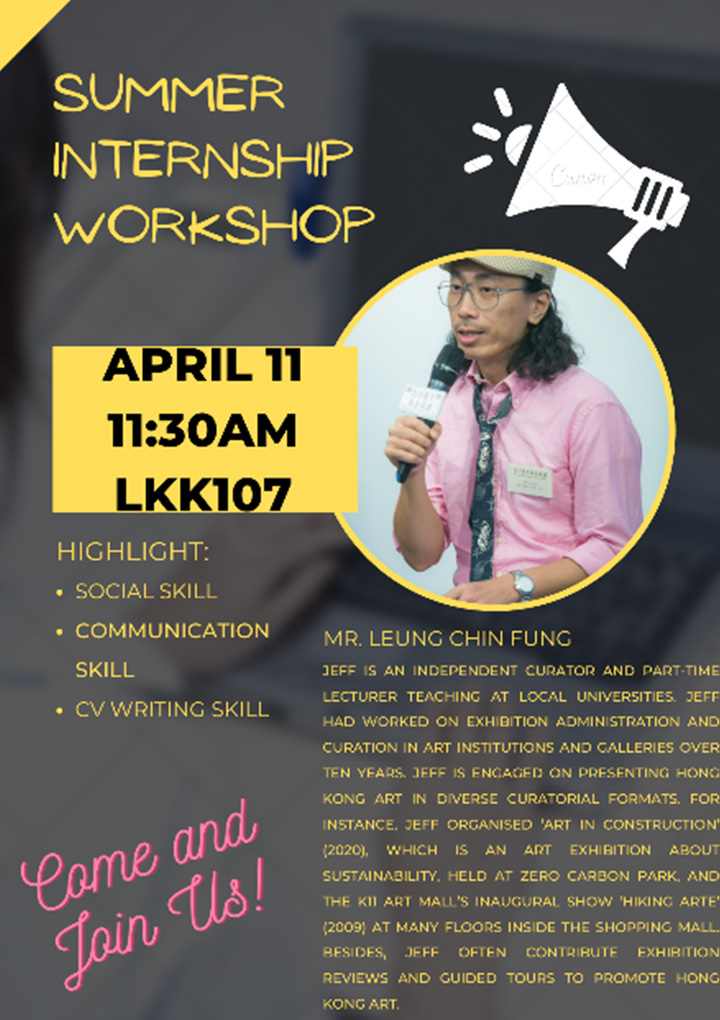
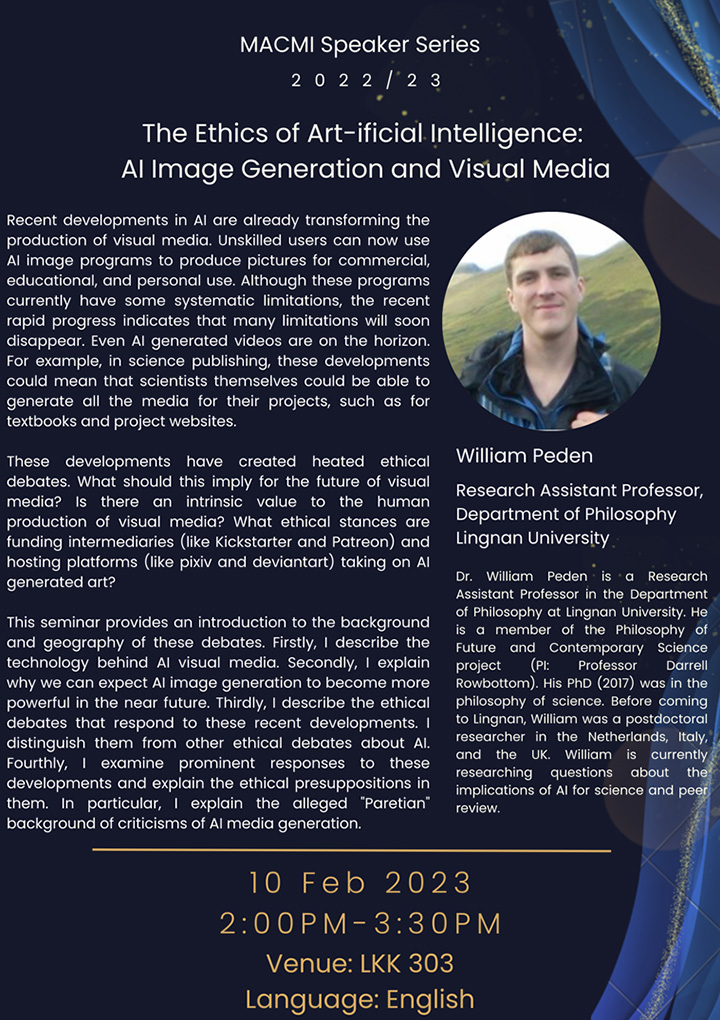
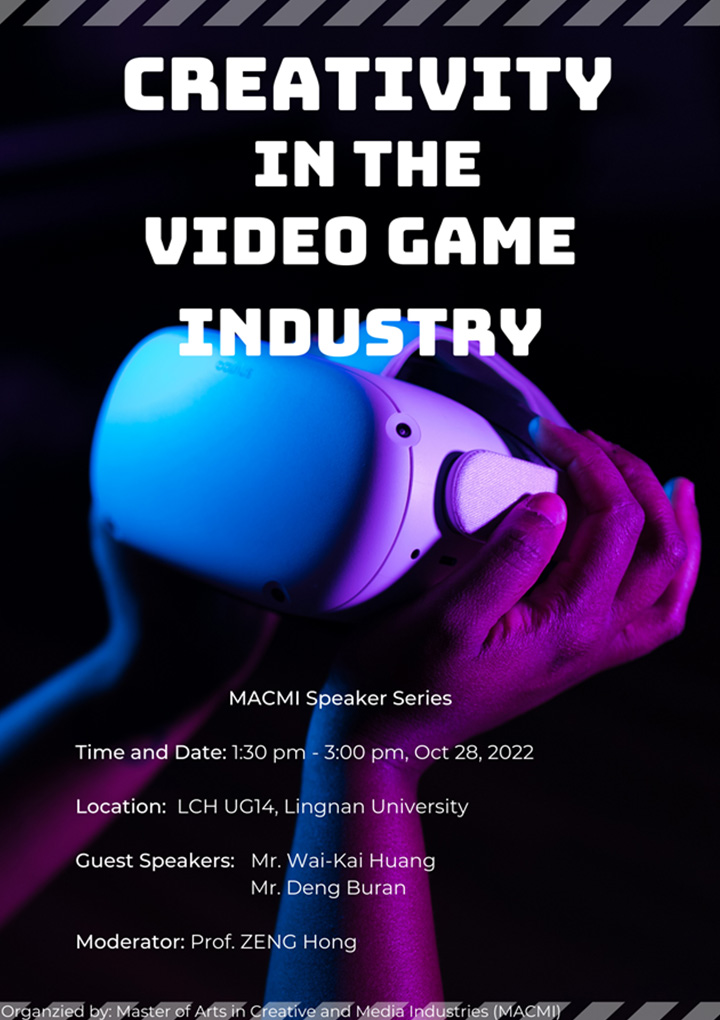
創意及媒體產業文學碩士課程由嶺南大學視覺研究系及哲學系合辦, 並由電影及創意產業研究中心(CFCI)協助。香港眾多文化經濟之中,尤以創意及媒體產業為香港文化經濟中最為蓬勃。有見及此,本碩士課程提供與該產業相關的基礎及進階課程, 涵蓋電影、電視、表演藝術、廣告、電腦遊戲、互動媒體,以及資料館、博物館及其他娛樂服務項目等領域。課程構分為三個部分:
本課程畢業生冀望能在香港、粵港澳大灣區與海外數以十計的創意及媒體行業中取得就業機會,工作部門包括政府部門、電影、媒體及藝術機構、藝術文化基金會、媒體、出版公司及各個位於香港及大灣區內的知名大型展覽和活動,例如:香港國際影視展(Filmart)、巴塞爾藝術展(Art Basel)、香港動漫電玩節、香港國際電影節、香港書展、澳門國際電影節、釜山國際電影節、東京國際電影節等。本地及大灣區內各表演展覽埸地亦提供不同工作機會,如戲曲中心、文化中心、大會堂、廣州大劇院、香港電影資料館、香港藝術館、M+、國立故宮博物院、深圳美術館及私人美術館等。
傳授跨學科知識,從⽽幫助學生理解創意及媒體產業的⾛勢和發展;
促進香港及大灣區內新興創意及媒體產業的發展;
滿足香港社會及經濟所需。
學生完成本課程後,應可達致下列目標:
綜合創意及媒體產業的理論、沿⾰和實踐,從⽽理解這新興知識經濟與學術研究領域;
解釋創意的概念,以及其在本地與各主要區域的創意及媒體產業中的作用;
握各種研究⽅法,並運⽤於個案研究當中;
構思及評估香港和大灣區內業界個案研究;
成為創意及媒體產業的從業⼈員(如活動統籌、製作人、項⽬經理、公關),或繼續深造成為學者。
本碩士課程共30學分,學員須修讀5門必修科、5門選修科或3門選修科及1項畢業習作。
This course will ground students in the conceptual foundations and historical claims made by the field of creative and media industries. And it will compare the features of a series of influential global/regional creative and media industries. Students will learn to skillfully reflect on the concepts and methods scholars have developed to analyse these industries and will build a research project addressing a creative industries topic of their own choosing.
The course aims to discover what media industries are, and how to approach them analytically. Matching research questions with businesses, practices, products and difficulties often found in film, television, and other media industries. Looking for revealing camouflage; learning how to approach media industries in the field, reverse engineering provisional theses from traits visible in media products.
This course will introduce students to some of the basic issues they can expect to face if they pursue a career in media industries, and will also delve deeper into select issues in order to encourage ethical reflection. The course will guide students to (1) discuss the basic legal and ethical issues facing the media in Hong Kong; (2) to reflect on current ethical questions relevant to a career in the media; (3) to discuss their views on ethical issues; and (4) to think creatively about solving ethical problems.
The course aims to install a deeper knowledge of Hong Kong as a robust creative and media industries hub in relation to cultural economy, creative talents and new business models. Students will explore key components and major milestones of the relevant sectors as they developed into a crucial part of Hong Kong’s cultural economy and signposts of the city’s cultural landscape.
This course aims to provide students with the opportunity to engage directly with prominent practitioners, artists, and professionals who work in the creative and media industries. Through this course, students will also have the chance to participate in major industrial fairs in Hong Kong, gaining valuable insight into the latest trends and developments in the industry. To achieve this, the course instructor invites experienced media producers and senior managers in media institutes as guest speakers to share their industry experiences and offer practical guidance for students’ career development. Following the guest lectures, students will participate in one‐hour tutorial sessions to discuss their takeaways and relate them to the theories they learn from the MACMI core courses. Additionally, field trips to events such as Art Basel and the Hong Kong International Film Festival will be arranged to enrich students’ first‐hand experiences of Hong Kong’s media and creative industries showcases.
This course will explore the relationship of art and technology through the study of art history from modern art to mixed-media art, net art, digital art, computer animation, CGI, interactive installation, robotic art, biotechnology and so forth. Different artists and their applications of different technologies will be studied to explore their relationship to transforming culture and society. Students will gain broader understanding and critical awareness of different concepts and developments of art and technology from early experiments by futurists and constructivists to most recent practices like interactive games and expanded reality experiments with wearable and portable media. The course will acquaint students with the creative ideas of art solutions related to technology and the overall impact of technology on the arts. It encourages students to analyze and criticize different forms and practices of electronic/media arts from conceptual design to practical applications.
The course aims to provide students with fundamental theories and analytical tools for investigating the role of architectural heritage in creative industries and its potential contribution to the quality of life and economy of the corresponding areas. It also aims to acquaint students with the visual/architectural skills for conducting on-site case studies and composing architectural proposal for creative reuse.
This course discusses some of the central issues that have been debated in contemporary mainstream aesthetics and philosophy of art. The topics covered in the course include: (a) the notion of aesthetic value and its connections with other values (for example, moral or artistic), (b) the nature and structure of aesthetic concepts and the way they are deployed in aesthetic understanding, (c) the mind-dependence (or mind-independence) of aesthetic properties such as beauty, ugliness, gaudiness, elegance and so on, (d) the definition of art, (e) specific philosophical issues related to contemporary forms of art, such as installations and digital art.
This course offers an introduction to the notions of imagination and creativity from the point of view of contemporary philosophy of mind. Among the questions investigated in this course: how is the imagination like and different from belief? How does imagination connect with action? How does imagination function in our engagement with fictions? In this course, we will also consider creativity as it relates to imagination: is imagination necessary or essential to creative thought? Finally, we consider some theories of creativity in the arts.
The course will introduce theories and histories of film conservation and digital humanities. It will show students how to utilise digital technology as a tool for visualisation of knowledge, and processing and analysing digital repositories. In addition, practical and ethical issues derived from digital conservation projects will be highlighted to help students in conducting their case studies.
The course aims to equip the students with the essential ideas about the key issues and agents involving Creative Industries (CIs) and cultural policy. In helping the students become familiar with the particular histories and practices of CIs and cultural policies in East Asia, the course aims to sharpen their critical thinking about the functioning and effectiveness of such practices in these countries. It aims at helping the students better understand the operations and forms of decision-making involving the media landscape across East Asia and beyond.
This is a course partly on visual attention – from the point of view of contemporary philosophy of mind – and partly on art. Some examples of questions to be addressed in the more mind-oriented component of the course: What is the content of visual experience? Can vision be top-down affected/penetrated by expectations/knowledge/ values? What is attention? Some examples of questions to be addressed in the more art-oriented component of the course: To what degree is taste/aesthetic judgment a perceptual (visual) phenomenon? What space is there for objectivity in aesthetic judgment? Do different perceivers (say an expert painter vs. a complete novice) *see* artworks differently?
This course empowers students to apply theories and methodologies learned across the MACMI curriculum to analyse – in depth – a creative and media industries topics of their own choosing. With the supervision of a faculty member with relevant expertise, students will engage in self-directed research and interrogate relevant scholarly perspectives on the object of their study. The capstone project will offer students a valuable opportunity to connect their MACMI scholarship with their future careers.
The course will offer students introduction to the philosophical, ethical, and technical notions required to understand the current debates surrounding AI and its impact in various areas of the creative and media industries. Influential theories and arguments will also be highlighted throughout the course.
Curating is a contested field of practice, mediating the production, circulation and consumption of art and culture, as well as offering a reflection on the social and cultural phenomenon. To enable students’ understanding of curatorial approaches, this course will introduce the histories of curating and curatorial discourses and practices in both Western and Asian contexts. It will focus on key themes and debates within exhibition-making such as the role of curator, boundary-pushing curatorial concepts, curating in and outside the museum and working with communities and other mediums and disciplines. Besides, it provides an experimental platform for students to interpret artworks and design.
This course explores the role of digital technologies in curatorial practice. It aims to provide competent knowledge of various forms of digital media employed by curators in exhibition design and museum management. Digital media provides specific potentials in interactive, participatory, physical or virtual presentations. The course will start with an overview of such development and application in a museum setting. With case studies to different digital tools, students will be familiar with their advantages and limitations, especially to their potentials in narrative, communicative and educational purposes. Students will be guided to identify the media specific properties and based on these, they will plan for an effective strategy to match curatorial objectives.
多數課程(包括所有必修科)以英語授課,部份選修科或以廣東話或普通話授課。
1年全日制
2年兼讀制
學生須修滿30學分(包括4門必修科、4門選修科及1項畢業習作),並達到總平均成績績點2.67或以上方可畢業; 學⽣亦須完成達到大學/課程的要求,以及⼤學畢業的英語水平。
申請入讀「創意及媒體產業文學碩士」課程,必須符合以下條件:
持有嶺南⼤學認可的榮譽學⼠學位或同等學歷;或
具備相關的優秀學術及專業成就証明;及
兼備良好英語能力。
如申請人若非持有本港大學頒授的學位或於非英語教學的大學取得學位,必須符合英語水平最低要求,托福(TOEFL)筆試550分或托福網考79分;或雅思國際英語語言測試(IELTS)6.5。持有同等資格者,本課程會作個別考慮。*
*英語測試證明須於提交入學申請表之日期前2年內考取方為有效。
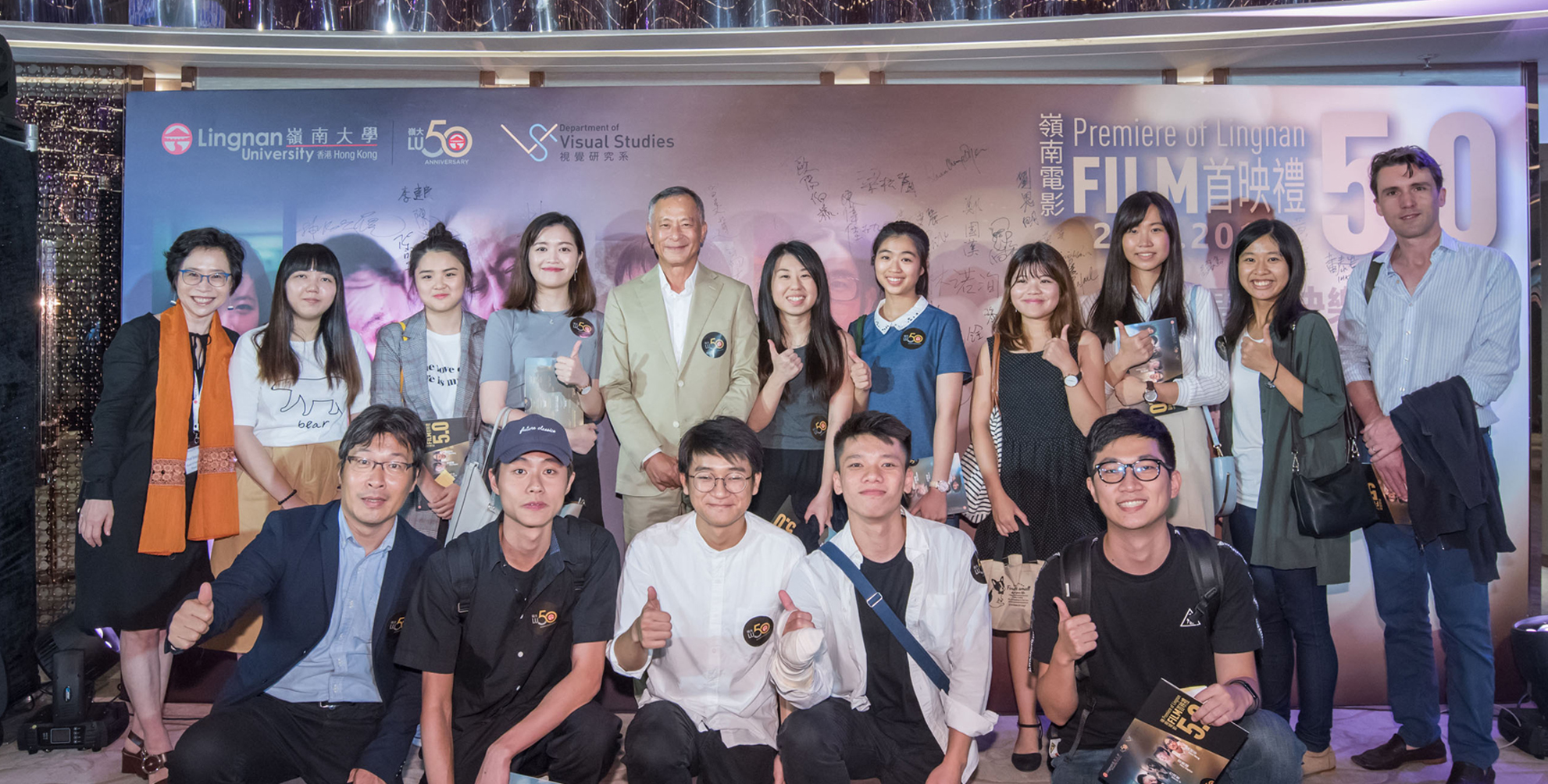
While the idea of forging a career in the world of art, music, film, television, or architecture used to be considered a risky bet, these fields can now also be seen as ones in which digital technology will always struggle to displace human creativity.
Lingnan’s new MA in Creative and Media Industries aims to recentre the human within creativity, explains Professor Wesley Jacks of the Department of Visual Studies.
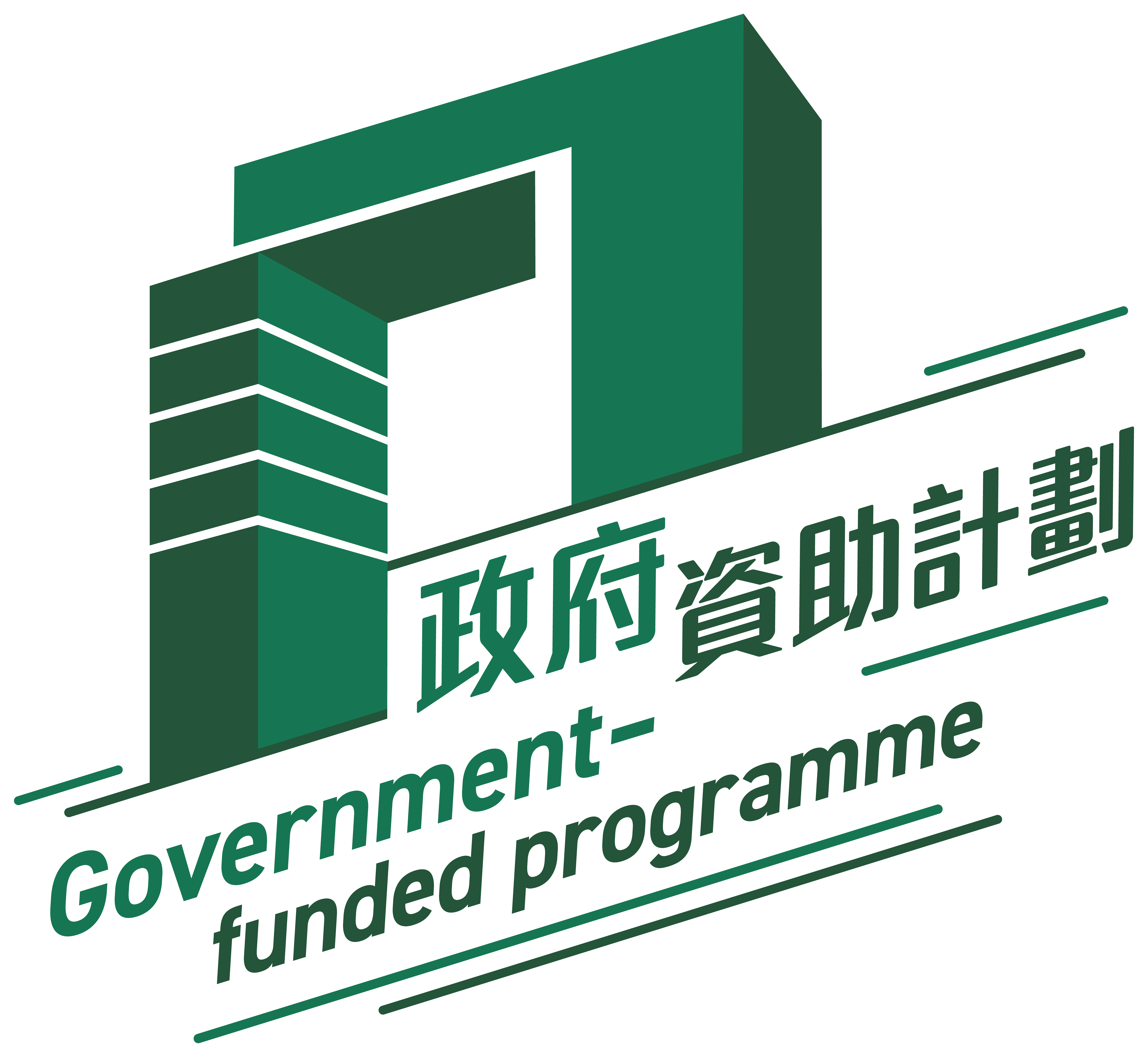
一年全日制︰於2024-2025年度入學之學生,每年學費為港幣$150,000
二年兼讀制︰ 於2024-2025年度入學之學生,每年學費為港幣$75,000
課程設有入學獎學金及畢業獎學金予合資格學生:
入學獎學金將頒予四名具優等學⼠學位及取得雅思七分或以上(或同級英文測試成績)的學生,獎學⾦為港幣$10,000;
畢業獎學⾦將頒予兩名畢業成績為3.5分或以上的學生,獎學⾦為港幣$10,000。
課程將會邀請合資格的本地學生提交申請,得獎者可獲得高達港幣$107,900元獎學金。
[註] 所有已遞交之文件均不獲退回。未獲取錄及拒絕取錄之申請者,其資料將於甄選過程結束後全部銷毀。
2023年11月1日至2024年5月31日

History of modern architecture in East and Southeast Asia, the material culture and history of Shanghai plaster, conservation of historical built heritages
問:何時發放面試結果?
答:我們會在兩週內通過電子郵件通知結果。
問:我應該何時及如何支付學位保證金及學費?
答:⼤學正式錄取通知書中包含付款⽅式和付款截⽌日期。我們建議本地學生使用支票付款,非本地學⽣以銀行匯票和電匯付款。
問:如果我沒有達到最低英語要求,該怎麼辦?
答:如面試後獲有條件取錄,我們建議您在限期前再次參加雅思/托福考試,考取最低英語要求。 若在期限屆滿前仍無法達成最低英語要求,有條件錄取會自動無效。
問:創意及媒體產業文學碩士課程會否提供獎學金?
答:所有就讀學生均符合申請入學獎學金的資格,該獎學金將頒授予學業成績傑出之學生。
(Please refer to the English version.)
((Please refer to the English version.))